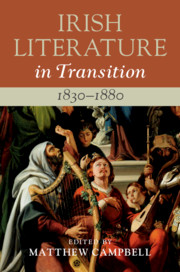Book contents
- Irish Literature in Transition, 1830–1880
- Irish Literature in Transition
- Irish Literature in Transition, 1830–1880
- Copyright page
- Contents
- Contributors
- Series Preface
- General Acknowledgements
- Acknowledgements
- Part I Contexts and Contents: Politics and Periodicals
- Part II Ireland and the Liberal Arts and Sciences
- Chapter 4 Naming the Place: The Ordnance Survey and Its Afterlives
- Chapter 5 Political Economy? The Economics and Sociology of Famine
- Chapter 6 Newman’s Irish University
- Chapter 7 The Charms of Ireland: Travel Writing and Tourism
- Part III From the Four Nations to the Globalising Irish
- Part IV The Languages of Literature
- Index
Chapter 4 - Naming the Place: The Ordnance Survey and Its Afterlives
from Part II - Ireland and the Liberal Arts and Sciences
Published online by Cambridge University Press: 29 February 2020
- Irish Literature in Transition, 1830–1880
- Irish Literature in Transition
- Irish Literature in Transition, 1830–1880
- Copyright page
- Contents
- Contributors
- Series Preface
- General Acknowledgements
- Acknowledgements
- Part I Contexts and Contents: Politics and Periodicals
- Part II Ireland and the Liberal Arts and Sciences
- Chapter 4 Naming the Place: The Ordnance Survey and Its Afterlives
- Chapter 5 Political Economy? The Economics and Sociology of Famine
- Chapter 6 Newman’s Irish University
- Chapter 7 The Charms of Ireland: Travel Writing and Tourism
- Part III From the Four Nations to the Globalising Irish
- Part IV The Languages of Literature
- Index
Summary
The topographical section of the Ordnance Survey in Ireland (1824-1842) produced a monumental study of the language, history and culture of Ireland. This chapter argues that the Survey, while often derided as an act of colonial appropriation and criticised for its inelegant translations of place names, was a crucial institution in the formation of Irish literature and in the construction of history and memory. The Survey’s many afterlives shaped the course of literary production in the nineteenth century, and three of those afterlives are briefly sketched out in this chapter. From the Survey’s preservationist attitude to the Irish language, to its part in the growth of a positivistic school of historical research and its hand in establishing the Aran Islands as a fount of an imagined national culture, the impact of the Survey is not far to seek in Irish culture in the nineteenth century.
- Type
- Chapter
- Information
- Irish Literature in Transition, 1830–1880 , pp. 61 - 77Publisher: Cambridge University PressPrint publication year: 2020

